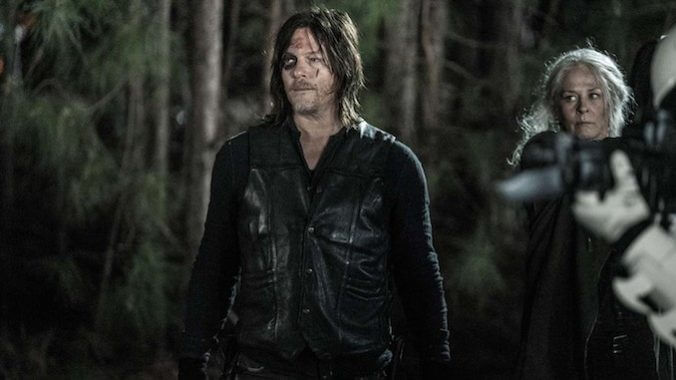The Walking Dead’s Finale Did Its Best to Say Goodbye in a Franchise Without End
Photo Courtesy of AMC
It’s a tall task to try and end a series that isn’t actually ending, per se, just breaking off into a handful of spinoff shows that aim to keep the core stars and fan favorites around on AMC’s airwaves for years to come.
It’s seemingly within that framework that The Walking Dead creative team found themselves when piecing together the long-teased, long-awaited and just plain long series finale to a show that is one of the last remaining vestiges of the Peak TV era. The final season has found our heroes facing their biggest challenge yet, grappling with a much larger community and tearing at the fabric of big questions about what makes a society work, and how we should remake the world when given the opportunity. Plus, of course, there are also zombies.
The final episode of the series paid off the bubbling tension within this larger community, the Commonwealth, with a political uprising that plays out with a full-on zombie horde crashing through the backdrop. It’s the type of story that could have been told across a season in the old days of The Walking Dead (remember that half-season focused simply on Hershel’s barn and the search for Sophia?), but with the show in its 11th season and plenty of buzzy spinoffs waiting in the wings, we instead got to see the key moments followed by a tidy “One Year Later” tag to show us everything would be fine in the end after the clean-up.
No matter how the current writers tried to end this series, it would always bump up against the thesis original creator Robert Kirkman wrote around back when The Walking Dead was just a black and white indie comic trying to make it to its first trade paperback: it’s the story of what happens after the traditional zombie movie credits roll, and yeah, it never really ends. It’s life. There are always more challenges, always more places to explore, people to meet and problems to solve. Oh yeah, and always more walkers.
AMC has more Walking Dead than ever in the works thanks to upcoming sequel spinoffs focused on Rick and Michonne, Negan and Maggie, and Daryl (not to mention long-running spinoff Fear the Walking Dead and new-ish anthology series Tales of The Walking Dead), which puts any proper “series finale” in a weird place to try and wrap up a series while simultaneously teeing up more stories than ever.
Which makes it all the harder to try and manufacture an “event” moment to end a show that’s only getting bigger. It’s just changing names and breaking out into more-focused silos. Which honestly makes sense, considering how much the ensemble and scope has ballooned over the years. The series that ended on Sunday is hardly recognizable from the saga of a lone deputy waking up alone in an abandoned Atlanta hospital, trying to find his family and simply stay alive.
-

-

-

-

-

-

-

-

-

-

-

-

-

-

-

-

-

-

-

-

-

-

-

-

-

-

-

-

-

-

-

-

-

-

-

-

-

-

-

-








































